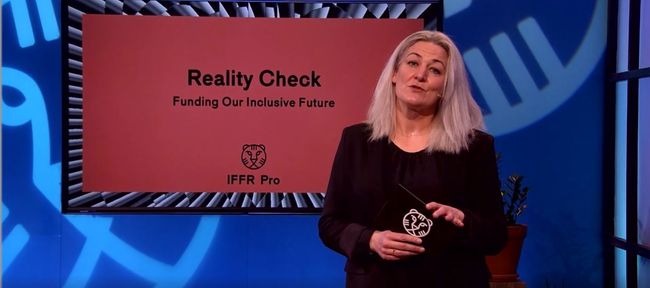Meet 'the fixer' Esther Schmidt
03 February 2021
IFFR’s Esther Schmidt is a communication consultant and writer working in the Dutch film scene. She’s also a skilled fixer who knows how the disparate elements within the Netherlands infrastructure work, and as importantly how they can be made to work together.
With Screen International’s Wendy Mitchell she will oversee Reality Check once more in 2021, an event that is pared down from previous years but still designed to pack a considerable punch.
On 4 February the ‘Telling a Different Story’ session will analyse how the industry can better support a storyteller from the inception of an idea. Bureaucratic expediency determines that it is much easier to categorise an idea at source, whether as a feature, a short or a VR, which may actually have the adverse effect of setting the project on the wrong path from the outset. How can the industry break away from such proscriptive practice?
The ‘Funding Our Inclusive Future’ debate (February 5) will examine how Europe’s public and private funders must look to support an industry in which widespread acknowledgement of diversity is, or at least should be, a given.
“Everybody is conscious that there has to be change, but there has to be a difference between saying and doing, between pledge and reality,” says Schmidt. “We are used to certain formats and practices, and so the infrastructure has to change, or there will not be room for other stories and other filmmakers.”
“At Reality Check we try to reflect on and discuss current issues from different and diverse angles, to create a more sustainable film eco-system,’ she adds.
In 2020, Reality Check also operated outside festival dates to offer both a sounding board and much-needed support to many in the industry who were grappling with their new, and ostensibly unrecognisable, professional lives. In small roundtables, industries from different but complementary sectors (festival, production, sales, funding etc) got together simply to listen to each other’s concerns.
“We created these really easily accessible ‘below the radar’ spaces online, because we wanted to do something that was not recorded, a place where people could talk to each other in a safe and discrete environment."
“We are all forced across the whole industry to promote our unique differences, but we felt this was the wrong time to try and differentiate ourselves. We wanted to find a mutually beneficial place and bring people together to ask 'what is your experience, what are you struggling with?’”
Schmidt reflects further on her work in coordinating the activities of the various film sectors for the greater industry good. She turns to the example of the Videoland Academy to illustrate what is possible.
“Videoland Academy is a great example of a co-operation between a streamer, a film fund and the three main festivals in the Netherlands to bring together all our experience, our knowledge and our know-how to create a platform for talent,” she says.
“Videoland finances and develops the projects and delivers a streaming platform. The Film Fund brings in more money for development and the festivals bring their experience and their own platforms, as well as organise masterclasses and workshops,” Schmidt continues. “They all bring their own unique contributions and oversight to the whole process. All these organisations have their strengths. Why not combine these for the benefit of the talent?”



